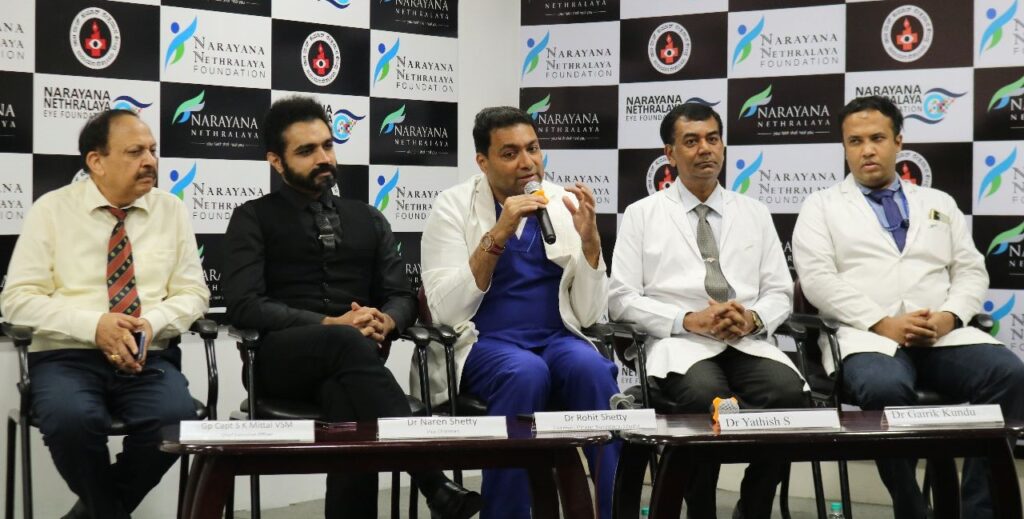Conjunctivitis Management using AI to predict severity – A Research done by Narayana Nethralaya, can help clinicians provide the right treatment that helps in better recovery.
Bengaluru 10th August 2023: As the monsoon rains continue, the number of cases of conjunctivitis, also known as ‘pink eye or Madras eye, is increasing. India is currently facing an epidemic of this contagious eye infection, which spreads through contact with contaminated fluids or surfaces. The cause of pink eye can be due to bacterial, viral, or allergic sources. However, the current epidemic appears to be primarily viral, specifically linked to an Adenovirus strain.


Narayana Nethralaya, a leading tertiary eye care institution, has seen over 100 patients daily of conjunctivitis in all its 4 units, with 30 % of them being children. The greatest challenge lies in treating newborn and our hospital has received many cases involving affected infants and their mothers. Narayana Nethralaya is taking proactive steps to address this outbreak. With a commitment to curbing its spread and raising public awareness, the institution emphasizes the significance of preventive measures. These include frequent handwashing, avoiding eye contact, wearing spectacles and goggles, and refraining from sharing personal items with those infected.
Symptoms of conjunctivitis include redness, itching, swelling, excessive tearing, discharge from the eyes and crusting of the eyelids. Treatment usually involves management of these symptoms. This may include use of antibiotics drops, steroid drops, vitamin supplements and use of oral antibiotics depending on the severity.
Narayana Nethralaya is dedicated to various research initiatives, emphasizing patient-centric care for ophthalmic conditions. Our current pioneering work using imaging and molecular diagnostics has enabled us to use AI and biomarkers in conjunctivitis to predict severity. This AI driven research has highlighted that people who are more prone to allergies or asthma showing high IgE levels and have low vitamin D levels are the ones who are getting severely affected. The AI model has demonstrated 97% accuracy, affirming its successful interpretation.
The most important area that holds promise is the study of tears from the conjunctivitis patients to identify unique proteins which make the condition severe. This molecular study gives the advantage of early intervention and prediction on who will probably go into a more aggressive form and have more challenges.
“Narayana Nethralaya is proud to be the first in the world to conduct a research using AI to predict the severity of conjunctivitis. This prediction can help clinicians provide the right treatment that helps in better recovery. This allows a clinician to titrate and triage the treatment better. This biomarker work in tears is probably one of the first in the country and this could be also one of the first conjunctivitis related tear biomarker research in the world.” said Dr Rohit Shetty, Chairman, Narayana Nethralaya.
“This research is of paramount importance to patients as well as doctors as this disease has been addressed with a blanket approach that may not be suitable for all. Depending on severity we can decide what medications would be suitable and in certain times starting topical steroids early can be beneficial.”- Dr Gairik, Consultant, Cornea and Refractive Surgery, Narayana Nethralaya.
“The COVID-19 pandemic has changed people’s lifestyles with most people and children staying indoors, leading to lower vitamin D levels. This can be a major predisposing factor for development of Conjunctivitis and its recent flare-ups. It is very important for children to play for a minimum of 2 hours outdoors so as to avoid Vitamin D deficiency.” Dr Naren Shetty, Vice Chairman, Narayana Nethralaya.
“Frequently, patients attempt various self-medicated approaches or misuse antibiotics that could lead to delay in recovery or complications. Instead, a comprehensive eye examination and personalized treatment are necessary. Therefore, we recommend seeking immediate medical attention when the symptoms are noticed to prevent long term corneal damage” advised Dr Yathish S, Head of the Cornea Department, Narayana Nethralaya.
“The eyes serve as a window to overall health. Utilizing AI and modern tools, we are revolutionizing medicine. By studying the eyes, we can understand the body’s parameters and immune responses, revealing diverse reactions to the same condition. The research at Narayana Nethralaya strives to offer a more holistic healthcare approach.” – Gp Capt S K Mittal VSM, CEO of Narayana Nethralaya.
To conclude, our focus is on addressing the core of a disease and our research on pink eye is aimed at achieving this goal. Narayana Nethralaya is continuously working towards improving patient outcomes through research using modern technologies like AI and the Biomarker tool to offer personalised treatment options.
About Narayana Nethralaya:
Narayana Nethralaya, established in 1982 by Dr K Bhujang Shetty, with a legacy spanning over four decades has consistently provided cutting-edge treatments. With a network of five advanced tertiary eye hospitals in Karnataka, we are proud to feature state-of-the-art operation theatres and world-class facilities. The institution’s commitment to eye care has earned it accolades and recognition as the best eye hospital in Karnataka for over a decade. Narayana Netralaya Foundation, under the aegis of Narayana Nethralaya is committed to pushing the boundaries of research to provide innovative solutions in translational research leading to improved patient care.













